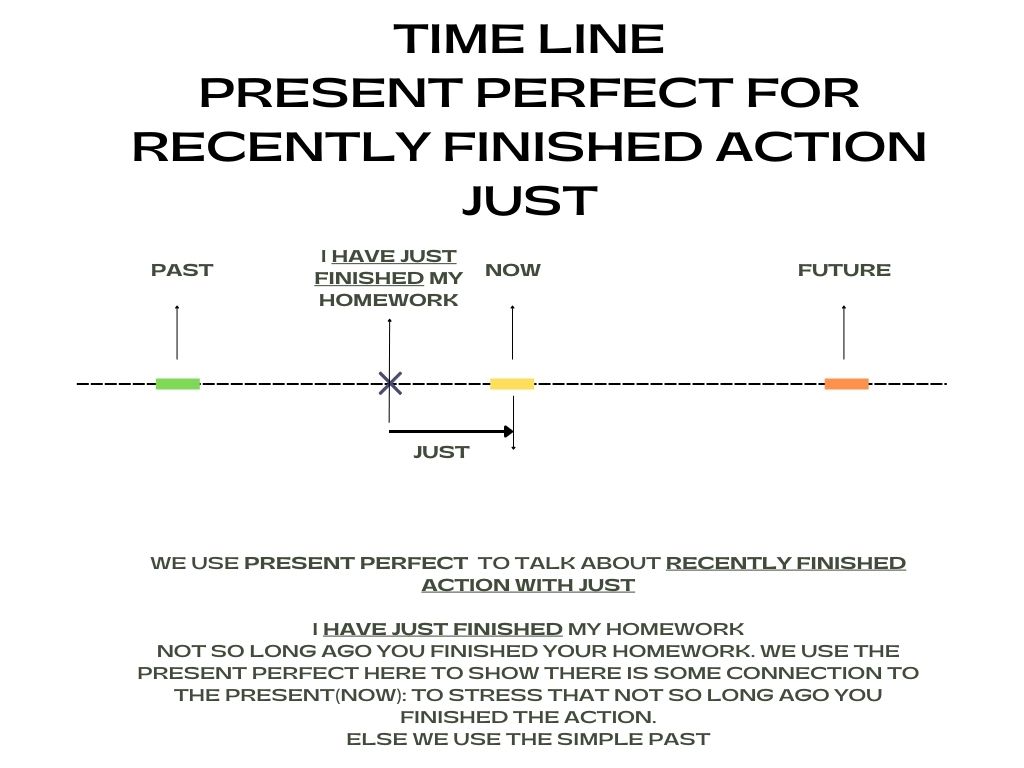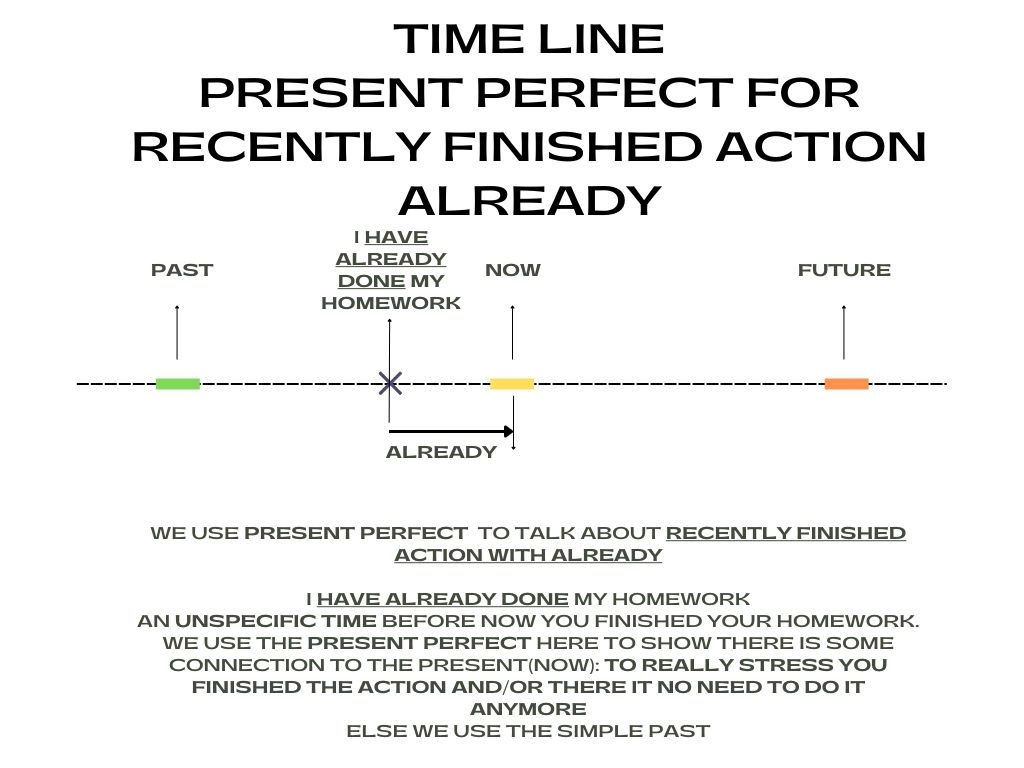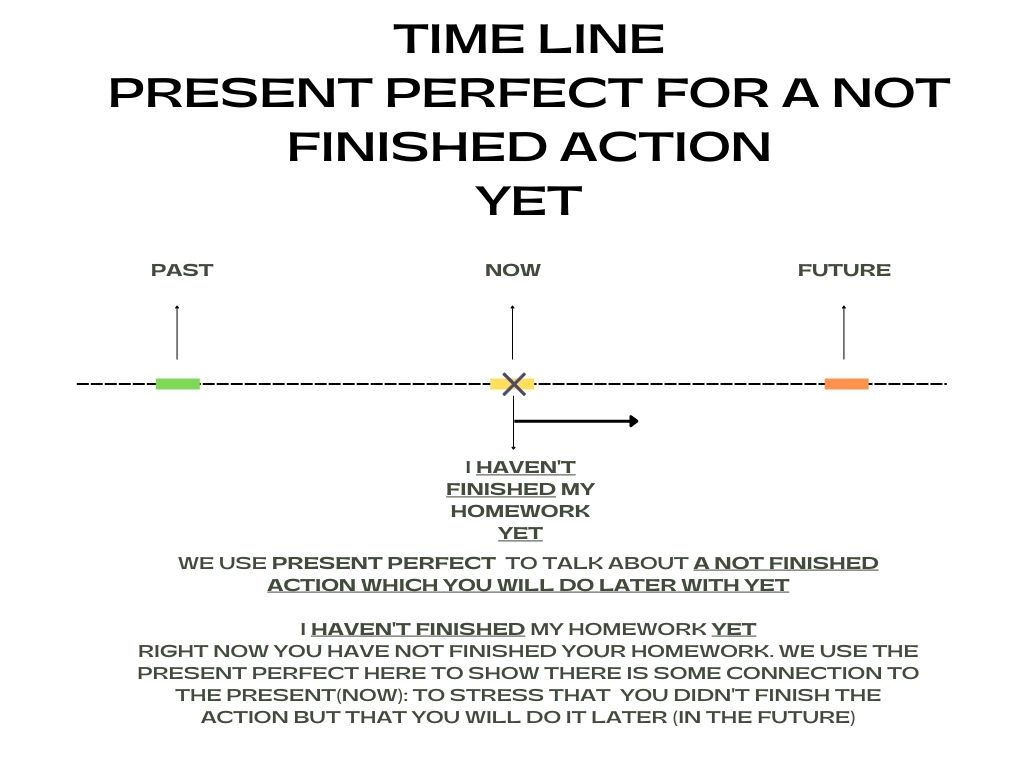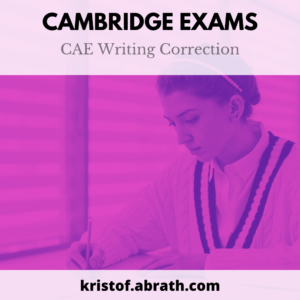
EnglishTutorHub


Adverbs of Time : just, now, already -School and Studying
Adverbs of time: just, now, already -school and studying.
In this full tutorial for beginners’ learners are going to learn how to use adverbs of time- just, now, already and match the words with each definition.
Subject matter: Adverbs of time: just, now, already Vocabulary Focus: School and Studying Materials: Charts, pictures
Learning experiences
A. Pre- activity
Vocabulary Drill
Show pictures about school and studying and have students tell what they see in the pictures
B. Activity Proper
Presentation
Teacher reads the passage as students listen and fill in the blanks and answer the questions.
I am Rin and my first day of the school-year was really great. My classmates, Tom, and Audrie were sitting just behind me in biology class, and Tom was sitting right next to me in math. We had a lot of fun. But we have to start studying a lot too. Now, I am finishing a history project that I was doing in the summer.
I am Rin and my first day of the school-year was really ________________. My classmates, Tom, and Audrie were sitting just _____________me in biology class, and Tom was sitting right next to me in math. We had _______________ fun. But we have to start studying a lot too. Now, I am finishing a history project that I was doing in the ____________.
Answer the questions.
- Who was sitting behind Rin in biology class?
- What is Rin doing now?
- What did Otto do after school?
Match the word with its definition.
Pass a fixed period of time for school or office
College to succeed in an examination
Term place to get higher education
C.Analysis and discussion
Discuss that adverb of time “ Just ” is usually used with Present Perfect Tense meaning “a short while ago”.
Examples: 1. John has just finished reading that book. (John finished reading that book 5 minutes ago.)
2.Tom just called. (Tom called a minute ago.)
Adverbs of time “ Already ” indicate that something has happened earlier (or earlier than expected).
Examples: 1. It is 2:29 hour but the bus has already left! (It was supposed to leave at 2:30)
2. John has already finished his homework. (He finished it earlier than expected.)
An adverb of time “Now” means that the action is happening at the moment of speaking or at present.
Examples: 1. I am doing a science project now.
2.Pierre is now taking a chemistry course.
Underline the correct word.
- I am working on a project/ college for my biology class.
- Jane passed/ made the test with a very good grade.
- The math diploma/ textbook can be found in the library.
Put the adverb in the correct position.
- Monica has finished the biology exam. (just)
- Our teacher is writing on the blackboard. (now)
- She has marked the exams and we will have the results tomorrow. (already)
Choose the correct adverbs of time to finish the sentence.
1. I’ve __________spent my salary and it’s two weeks before pay day.
a. now b. already c. just
2. The train’s__________ left! What are we going to do?
3. I’ve just seen Susan coming out of the cinema.
a. already b. now c. just
4. Mike’s just called. Can you ring him back please?
a. just b. now c. already
Write “What is your favorite school subject and why?
Give three reasons.
For more readings
- When to use “a little” and “a few”: English Grammar Rules
- Compound Words: English Vocabulary
- The difference between MUST and HAVE TO
- Question Tags: Basic Rules
- Present perfect tense / Part 1 -form
If you have any questions or suggestions about The Adverbs of Time: just, now, already -School and Studying , please feel free to leave a comment below or send us a message using our contact page
Leave a Comment Cancel reply
Save my name, email, and website in this browser for the next time I comment.

- B1-B2 grammar
Present perfect: 'just', 'yet', 'still' and 'already'

Do you know how to use just , yet , still and already with the present perfect? Test what you know with interactive exercises and read the explanation to help you.
Look at these examples to see how just , yet , still and already are used.
I've just seen Sai. He's really enjoying his new job. We haven't decided what to do yet. I still haven't called Yumi to see how she is. I've already had lunch but I'll join you for coffee.
Try this exercise to test your grammar.
'just', 'yet', 'still' and 'already': Grammar test 1
Read the explanation to learn more.
Grammar explanation
We often use just , yet , still and already with the present perfect because they are related to the present moment. This page focuses on the meaning and use of these words when they are used with the present perfect.
Just used with the present perfect means 'a short time before'.
I've just seen Susan coming out of the cinema. Mike's just called. Can you ring him back, please? Have you just taken my pen?!
Just comes between the auxiliary verb ( have/has ) and the past participle.
Yet used with the present perfect means 'at any time up to now'. We use it to emphasise that we expect something to happen soon. Yet (in this context) is only used in negative sentences and questions.
Have you finished your homework yet? I haven't finished it yet. I'll do it after dinner. A. Where's Sam? B: He hasn't arrived yet.
Yet comes at the end of the sentence or question.
Still used with the present perfect means that something hasn't happened. We use it to emphasise that we expected the thing to happen earlier. Still (in this context) is only used in negative sentences.
I've been waiting for an hour and the bus still hasn't come. They promised me that report yesterday but they still haven't finished it. She still hasn't replied to my email. Maybe she's on holiday.
Still comes between the subject ( the bus, they, etc.) and auxiliary verb ( haven't/hasn't ).
Already used with the present perfect means 'before now'. We use it to emphasise that something happened before something else or earlier than expected.
I've already spent my salary and it's two weeks before payday. He wanted to see Sudden Risk but I've already seen it. The train's left already!
Already can come between the auxiliary and the main verb or at the end of the clause.
Do this exercise to test your grammar again.
'just', 'yet', 'still' and 'already': Grammar test 2
Language level
Hello, Could you tell me the difference in meaning between these two sentence? I just moved in I've just moved in
- Log in or register to post comments
Hello Khangvo2812,
Generally, we use the present perfect ( I have moved in ) when an action in the past (moving in) has a present result or effect (here I am/I'm your new neighbour). We use the past simple ( I moved in ) when an action is solely in the past without any present echo.
However, for very recent actions in the past with just there is a difference in British and American English. British English speakers tend to use the present perfect with just while American speakers often us the past simple instead. I would say that that is the main difference here. A British English speaker would choose the second sentence, while an American English speaker would be more likely to choose the first.
You can read more about the present perfect and past simple here:
https://dictionary.cambridge.org/grammar/british-grammar/past-simple-or-present-perfect
https://www.cambridgeenglish.org/learning-english/activities-for-learners/b1g003-past-simple-and-present-perfect
The LearnEnglish Team
Hi, team! Can you please clarify why we use "yet" and present perfect tense (we have been to the restaurant...) in the last sentence? As far as i know "yet" mostly used in negetive and questions with present perfect tense. The context is following: B: I ate sushi for the first time on my dad's 50th birthday. He invited the whole family to a Japanese restaurant. A: Did you like it? B: Absolutely. In fact, it was so good that we have been to that restaurant three times yet. And on my mum's birthday, we ordered some sushi and had it at home.
Hello Babanova,
That does not look like a correct use of 'yet' to me. I would use 'already' or 'since then'.
Hello, I think your website is good but it's better to have more practices and tests because for example when we've just studied grammer,we need many perfect tests and challenge to overcome over the grammer subject. We also need advance grammer , if you could add to this site,please. Thank you
Hello mr_bahrami2011,
Thanks for your feedback. There are quite a few advanced grammar points covered in our English grammar reference . There are also usually more exercises on those pages.
I'm also pleased to say that we are working on a C1 grammar and hope to publish it here soon.
You might also want to consider some of the options in our Online courses section if you'd like more in-depth work.
All the best, Kirk LearnEnglish team
Hello I think this is a real good place to learn English, but I am new here I can't find the worksheet in grammar B1 section.
Hello samayullah,
We're glad you found LearnEnglish!
Most of our site has worksheets, but I'm afraid our Grammar and Vocabulary sections do not. One day we'd like to create them, but at the moment it's simply too much work for our small team.
Hi there, I hope you are fine, and doing well. I, personally, think that this is the best website for English learners. However, I have a feedback which is what if you share a video with the grammar lessons, this way I think we will better learn each lesson.
Hi johny-jan,
Thanks for your message! We're always glad to hear that people find LearnEnglish useful and are happy to get suggestions.
That's a great idea about video lessons for grammar. We did a series of webinars on different grammar points which you can find in General English > LearnEnglish webinars .
There are also quite a lot of resources focusing on grammar on our Facebook page that I expect you might find useful.
I hope you find something useful there too!
All the best, Kirk LearnEnglish Team
Online courses

Group and one-to-one classes with expert teachers.

Learn English in your own time, at your own pace.

One-to-one sessions focused on a personal plan.

Get the score you need with private and group classes.
- 606-889-173
- [email protected]
- Czech Republic
Present Perfect
For recently finished actions.

Table of Contents
In this grammar section we will have a look at the tense Present Perfect to talk about recently finished/completed actions.
A: How long have you worked there? B: I have worked there for 3 years.
A: How long have you been friends? B: We haven’t been friends for long. We have been friends since 2022
The video gives an overview of to Present Perfect for something recently completed/finished actions.
It shows the meaning/usage: when and why to use the Present Perfect.
For the form and the pronunciation have a look a the different webpages:
- Present perfect form
- Present perfect pronunciation
Usage/ Meaning
How and when do we use the Present Perfect?

Present Perfect is also used to talk about something recently finished.
I have just done my homework: This means not so long ago you finished your homework . It is an unspecified time in the past . We don’t know when the person did it, but it wasn’t so long ago . It is usually used to stress that you finished the action and there it no need to do it anymore or no need to worry about it anymore .

I have already done my homework: This means you finished your homework somewhere before now . It is an unspecified time in the past . We don’t know when the person did it . It is usually used to stress that you finished the action and there it no need to do it anymore or no need to worry about it anymore .

Present Perfect is also used to talk about something that is not finished.
I haven’t done my homework yet : This means you did not finished your homework somewhere before now but that you will do it later . It is usually used to stress that you did not finished the action but you will do it somewhere soon in the future.
- Just: recently finished actions. positive and questions. Between have and the main verb : I have just finished .
- Already: finished actions. positive and questions. Between have and the main verb : I have already finished .
- Yet: not finished, but will finish it later. Negative and questions. At the end of the sentence: I haven’t finished yet .

Have a look at the questions and write your answers in the comments below . Also give us some more details about when, where, why,….
- What have you already done today?
- What haven’t you done yet today, but must still do today?
- What have you just finished before answering these questions?
- Have you just had some food?
- Have you already finished your homework?
- Have you already studied today?
- Have you just had a phone call?
- Have you already had lunch today?
- Which movie have you already seen more than 2 times?
- Which goals in your life have you already achieved?
Spread the word
Kristof Abrath Teacher, Trainer, Course Designer Teaching in English on 4 different continents since 2006.
More tenses
English courses, additional services.

Grammar Bootcamp Tenses Level 2
€ 99,95

Cambridge Advanced CAE Full Writing correction
€ 24,99
Cambridge Advanced CAE Basic Writing correction
€ 14,99

Cambridge First FCE Full Writing correction
Cambridge first fce basic writing correction.

Phrasal Verb Course 1
€ 11,00
Comments or Questions?
Leave a reply cancel reply.
Your email address will not be published. Required fields are marked *
This site uses Akismet to reduce spam. Learn how your comment data is processed .

Kristof.abrath.com is registered under Kristof Abrath IČO: 07420609
- Job interview preparation
- Business English
- Business Communication
- Business Writing
- English Speaking
- English Writing
- English Grammar
- English Vocabulary
- Private English Course
- Teacher Training
- Teacher Training Workshops
- What we offer
Welcome Back
Login to your account.
- Dictionaries home
- American English
- Collocations
- German-English
- Grammar home
- Practical English Usage
- Learn & Practise Grammar (Beta)
- Word Lists home
- My Word Lists
- Recent additions
- Resources home
- Text Checker
- I 've already visited three universities.
- She 's just won the match.
- I haven't made a decision yet .
- ‘ Have you seen that new film yet ? ’ ‘ Yes, I have . / No, I haven't . ’
- visit → visit ed arrive → arriv ed
- have, had → had lose, lost → lost
- do, did → done eat, ate → eaten
- They 've just made a big announcement.
- Have you finished that book yet ?
- Spring has already arrived in Madrid!
- Practice 1 Gap-fill
- Practice 2 Gap-fill
- Practice 3 Multiple choice
- Practice 4 Multiple choice
- Practice 5 Gap-fill
- Practice 6 Multiple choice
- Practice 7 Multiple choice
- Practice 8 Gap-fill
- Practice 9 Gap-fill
- Practice 10 Gap-fill
- Practice 11 Gap-fill
ENGLISH 4U English Language Learning
- GRAMMAR EXERCISES
- TENSES EXERCISES
- GRAMMAR QUIZZES & TESTS
- IRREGULAR VERBS
Present Perfect Simple
The Present Perfect Simple is used, if an action happened in the past and there is a connection to the present. This action has just stopped or is still going on. There's no exact time expressed when the action happened.
Key words: already , just , yet , ever , never , for , since , so far , up to now , not yet , lately , recently
How to form the Present Perfect Simple
I, you, we, they - have + 3rd form he, she, it - has + 3rd form
They have visited her uncle recently. - She has just baked an apple pie.
Short forms
I 've never been there before. - We 've studied a lot so far.
He 's worked in this shop lately. - He 's found his wallet.
I, you, we, they - have not (haven't) + 3rd form
he, she, it - has not (hasn't) + 3rd form
They haven't tidied up their room so far. - He hasn't finished his homework yet.
Have you already done your homework?
Have/Has - subject - verb
How long have you been there?
Question word - have/has - subject -verb
Use of the Present Perfect Simple
Nick has gone on holidays. - result - He is not in the office.
He has already met Sue. - connection to the present - He likes her.
He has just eaten something bad. - connection to the present - He feels sick now.
He has lived in Spain for ten days. - connection to the present - He is still there.
He has been in Spain since Friday. - connection to the present - He is still there.
Have you ever been to Italy? - connection to the present - Do you know Italy? No, I 've never been there.
Present perfect simple - Exercise 1
Present perfect simple - Exercise 2
Present perfect simple - Exercise 3
Present perfect simple - Grammar Test
Present perfect questions - Exercise 1
Present perfect questions - Exercise 2
Present perfect questions - Exercise 3
For or since - Exercise 1
For or since - Exercise 2
Past simple or present perfect - Exercise 1
Past simple or present perfect - Exercise 2
Past simple or present perfect - Exercise 3
Past simple or present perfect - Exercise 4
Past simple or present perfect - Exercise 5
Past simple or present perfect - Exercise 6
Past simple or present perfect - Multiple Choice Exercise
CONTACT / Privacy Policy / Cookie Policy / SITEMAP
© Copyright 2001-2024 Herwig Rothländer - All Rights Reserved
Simple Past or Present Perfect Simple
Put the verbs into the correct tense (simple past or present perfect simple).
- I (just / finish) my homework.
- Mary (already / write) five letters.
- Tom (move) to this town in 1994.
- My friend (be) in Canada two years ago.
- I (not / be) to Canada so far.
- But I (already / travel) to London a couple of times.
- Last week, Mary and Paul (go) to the cinema.
- I can't take any pictures because I (not / buy) a new film yet.
- (they / spend) their holiday in New Zealand last summer?
- (you / ever / see) a whale?
- Skip to content
- Skip to footer
learnEnglish-online
Learn English Online for Free
Main navigation
Present perfect.
The present perfect is a common verb tense in English. It can be used in many ways. It is formed like this:
Here are some examples:
- I have eaten dinner.
- You have taken the test.
- He has finished his homework.
- We have seen the movie.
- They have driven a car.
For negative sentences, just add “not”, like in these examples:
- I have not eaten dinner.
- He has not finished his homework.
Contractions :
Have + Not = haven’t
Has + Not = hasn’t
- I haven’t eaten Spanish food.
- She hasn’t finished her homework.
Present Perfect Questions
To ask questions in the present perfect, start with “Have” or “Has”.
Yes, I have. Yes, she has.
No, I haven’t. No, he hasn’t.
Examples:
- Have you visited Paris? No, I have not.
- Has she flown in an airplane? Yes, she has.
- Have they worked in an office? Yes, they have.
Present Perfect Uses
The present perfect has 2 main uses:
- Actions in the past with no specific time
- Actions in the past that continue into the present
No Specific Time
Present perfect is for actions in the past with no time. This could be for a number of reasons:
- Time is unknown
- Time is not important
- The action has happened many times
Let’s think about a few examples.
- He has found his keys.
- I have gone to New York City 3 times.
- I have not finished my project.
- We have seen that movie many times.
In this example, it is not important when he found his keys. We only care he found them.
This example shows an action that has happened many times. Because the present perfect has no specific time, it is not used with time phrases. These examples are incorrect .
- I have eaten lunch yesterday .
- She has taken an English class last year .
In a situation with a specific time, use the simple past . For example:
- I ate lunch yesterday.
- She took an English class last year.
Actions that Continue to the Present
Some actions start in the past, but they continue in the present. This is shown with the present perfect.
- I have lived in Paris for 3 years.
(I live in Paris now.)
- She has worked as a teacher since 2003.
(She started to teach in 2003. She is a teacher now.)
- I have been a student at this school for 2 years.
(I am still a student.)
Present Perfect Key Words
There are some key words used with the present perfect that include the following:
For is used for periods of time. Some examples of time are years, days, or hours.
- I have been a teacher for 4 years.
- Karen has lived in Toronto for 8 years.
- They have been here for 2 hours.
Since is used for specific dates.
- I have been a teacher since
- Karen has lived in Toronto since
- They have been here since 5:00 pm.
Watch how for and since are similar but different.
- I have been a teacher since 2004. I have been a teacher for 9 years.
- He has not eaten since 3 pm. He has not eaten in 6 hours.
To practice the difference between for and since , use this test:
For and Since Test
“Yet” is for negative sentences and questions. It always goes at the end of the sentence. Here are some examples:
Negative Sentences
- I have not eaten dinner yet .
- She has not seen that movie yet .
- They have not arrived yet .
Questions
- Have you eaten dinner yet ?
- Has he seen that movie yet ?
- Has Tina arrived yet ?
“Already” is for affirmative sentences. It can go at the end of a sentence:
- I have eaten dinner already .
- She has taken the test already .
- Dan and Jen have had breakfast already .
It also goes between the auxiliary and the main verb:
- I have already eaten dinner.
- She has already taken the test.
- Dan and Jen have already had breakfast.
Here are some more examples:
- She has already
- He has left already .
- Jake and Fred have already finished their work.
Still is for negative sentences. It goes before the auxiliary verb. Here are some examples:
- I still have not eaten dinner.
- She still has not arrived.
- Chris still hasn’t woken up.
To practice the difference between already , still , and yet , try this test:
Already, Still, Yet Test
Present Perfect Mistakes
Watch out for these common mistakes when you are using the present perfect.
Not using the proper form of the verb
- I have went to the park.
- She has ate dinner.
Present perfect always uses a past participle.
- I have gone to the park.
- She has eaten dinner.
Also, watch out for mistakes with irregular verbs.
- I have boughten a jacket. (bought)
- She has flied in an airplane. (flown)
Using the present perfect with a specific time
- I have visited Toronto last year.
- Yuri has watched the movie yesterday.
Remember: Present perfect never uses a specific time. That is simple past .
Not using ever and never properly
- Did you ever see that movie?
- I have ever heard that song.
- Have you never gone to California?
If you would like to practice more with the present perfect, you can also try the free tests at learnEnglish-online :
Present Perfect Test Present Perfect Test 2 Present Perfect Test 3 Present Perfect Test 4
Present perfect vs. simple past test present perfect vs. simple past test 2, for and since test still, already, yet test, present perfect listening exercise, (adsbygoogle = window.adsbygoogle || []).push({});, more grammar lessons and tests.
- Conditionals
- Countable and Uncountable Nouns
- Gerunds and Infinitives
- Modal Verbs
- Passive Voice
- Prepositions
- Rather and Prefer
- Subject Verb Agreement
- Verb Tenses
Start Your Free English Course Today!
Grammar Writing Listening Reading Vocabulary
IELTS TOEFL TOEIC Business English
- Grammar Lessons
- Grammar Exercises
- Grammar Quizzes
- Mixed Tests
- PDF Worksheets
- Beginners Lessons
- Easy Worksheets
- Beginners Tests
- Reading Exercises
- Drag & Drop Grammar
- English For Kids
- Kids Word Games
- Picture Vocabulary
- Reading Tests
- Short Dialogues
- Short Sentences
- Closest in Meaning
- Irrelevant Sentence
- ESL Paragraphs
- GRE Reading
- Text Completion
- GRE Equivalence
- SAT Sentence
- Essay Writing
- Vocabulary Exercises
- Study Skills Tips
- Drag & Drop Vocab
Present Perfect / Simple Past Key

- Rules/Help/FAQ Help/FAQ
- Members Current visitors
- Interface Language
Follow along with the video below to see how to install our site as a web app on your home screen.
Note: This feature may not be available in some browsers.
- English Only
Has/Hasn't he finished the homework yet?
- Thread starter yellow sun
- Start date Apr 5, 2014
Senior Member
- Apr 5, 2014
Hi: I hear that my brother is still writing his homework, so I express my surprise and disapproval by saying: -Hasn't he finished the homework yet? But If I say : -Has he finished the homework yet? What it would express? Thanks.
Liam Lew's
It would mean "Has he already finished his homework?"
As you say, the first expresses disapproval. The second is a simple question without any judgement. (neither approval nor disapproval)
Thanks. yet= until now and already=previously, but here as Liam Lew's said : yet=already. is it only in that context or we could use it in that meaning as one of its usage?
yellow sun said: Thanks. yet= until now and already=previously, but here as Liam Lew's said : yet=already. is it only in that context or we could use it in that meaning as one of its usage? Click to expand...
Biffo said: The second is a simple question without any judgement. Click to expand...
- Apr 6, 2014
yellow sun said: Thank you very much Biffo. so, what is the nuance between the two simple questions: -Has he finished the homework yet? -Has he finished the homework? Click to expand...
Confirm Password *
By registering, you agree to the Terms of Service and Privacy Policy . *
Username or email *
Forgot Password
Lost your password? Please enter your email address. You will receive a link and will create a new password via email.
Sorry, you do not have permission to ask a question, You must login to ask a question.
Please briefly explain why you feel this question should be reported.
Please briefly explain why you feel this answer should be reported.
Please briefly explain why you feel this user should be reported.

English Notes
English notes latest questions, he said, “i have finished my homework.” change into indirect speech.
Indirect Speech: He said that he had finished his homework.
Explanation : When the reporting verb is in the past (said) and the direct speech is in the present perfect tense, then the indirect (reported) speech will change into the past perfect tense.
Present Perfect Tense > Past Perfect Tense.
Learn Narration
- Share on WhatsApp
- Share on Facebook
- Share on Twitter
- Share on LinkedIn
- Select as best answer
Indirect Speech : He said that he had finished his homework.
He said that he had finished his homework.
You must login to add an answer.


He ___ his homework before dinner.
B. finished
C. finishing
D. finishes
Select your answer:
Next Quiz >
Other quiz:
Some of the cookies ____ been eaten.
She was full of the joys of ______.
How to use : Read the question carefully, then select one of the answers button.
GrammarQuiz.Net - Improve your knowledge of English grammar, the best way to kill your free time.

IMAGES
COMMENTS
It may mean the speaker thinks he should have. I wonder if he's finished his homework already. This also refers to the person finishing his homework by the time of the statement. But it suggests the speaker wouldn't be surprised if the person doing his homework needed more time, but thinks it's possible he may have done it by that time. W.
It is 2:29 hour but the bus has already left! (It was supposed to leave at 2:30) 2. John has already finished his homework. (He finished it earlier than expected.) An adverb of time "Now" means that the action is happening at the moment of speaking or at present.
Just comes between the auxiliary verb (have/has) and the past participle. yet. Yet used with the present perfect means 'at any time up to now'. We use it to emphasise that we expect something to happen soon. Yet (in this context) is only used in negative sentences and questions. Have you finished your homework yet? I haven't finished it yet.
Jun 12, 2013. #3. Procol said: "I have just now finished my homework" is perhaps more usual, but your sentence is not wrong. You might put the "just now" at the end for greater emphasis, for example. But according to "Practical English Usage": "I've telephoned Ann just now" is wrong. Thanks. Last edited: Jun 12, 2013.
I have just decided to sell my apartment. I'm on the way to the station. The train has just arrived. I have just finished my homework. Having said that, In American English it's acceptable to use" just" with simple past as well as with present perfect to express that something recently happened. I just finished my homework.
Just. Present Perfect is also used to talk about something recently finished. I have just done my homework: This means not so long ago you finished your homework. It is an unspecified time in the past. We don't know when the person did it, but it wasn't so long ago. It is usually used to stress that you finished the action and there it no ...
We can use the present perfect positive with just or already: Subject + have/has + just/already + past participle. three universities. the match. We usually use short forms ( I've, You've, He's, etc.) when we are speaking and in informal writing. We can use the present perfect negative with yet: Subject + haven't/hasn't + past participle + yet.
The Present Perfect Simple is used, if an action happened in the past and there is a connection to the present. This action has just stopped or is still going on. There's no exact time expressed when the action happened. Key words: already, just, yet, ever, never, for, since, so far, up to now, not yet, lately, recently.
I'm afraid I disagree with the other answers so far given. "He has finished" is present perfect as has been stated. However, "he have finished" is the present perfect subjunctive, which although rare is perfectly correct. For example, "It is necessary that he have finished two years of music theory before getting his degree."
Exercise 8. Put the verbs into the correct tense (simple past or present perfect simple). I (just / finish) my homework. Mary (already / write) five letters. Tom (move) to this town in 1994. My friend (be) in Canada two years ago. I (not / be) to Canada so far. But I (already / travel) to London a couple of times. Last week, Mary and Paul (go) to the cinema.
He has finished his homework. We have seen the movie. They have driven a car. For negative sentences, just add "not", like in these examples: I have not eaten dinner. He has not finished his homework. Contractions: Have + Not = haven't. Has + Not = hasn't . Examples: I haven't eaten Spanish food. She hasn't finished her homework.
5. My brother has written (write) several plays. He has just finished (just/finish) his second tragedy. 6. I flew (fly) over Loch Ness last week. Did you see (you/see) the Loch Ness monster? 7. I haven't seen (not see) him for three years. I wonder where he is. 8. He hasn't smoked (not smoke) for two weeks. He is trying to give it up. 9.
2. While I agree that: Having finished her homework, she went for a walk. is more clear, I think context and common sense would tell us that the original sentence means the same thing: Finishing her homework, she went for a walk. Many writing guides tell us to avoid dangling modifiers, and sentences with this same structure are used as examples ...
The phrase did not finish is in the past tense, while the word yet indicates that the task is ongoing (present tense), which creates a contradiction. The sentence "I have not finished it yet" is correct because the phrase have not finished is in the present tense and can be safely used with "yet". In fact, the word "yet" is not strictly necessary.
Study with Quizlet and memorize flashcards containing terms like (you / finish) _____ your homework before you went to the cinema?, (why / you / clean) _____ the bathroom before you bathed the dog?, (you / have) _____ breakfast before you came here? and more. ... Just thinking irregular vers 8th grade. Teacher 19 terms. Irene_mir. Preview ...
He may just need to finish some homework, but not all of it, he may be finishing somebody else's homework (though context suggests that's not true, nothing in the statement refutes it). The best way to say it would probably be, "Read after he's finished his homework."
Grammar › View. Ruby: Did Justin like your idea for summer vacation? Morgan: No he didn't. In fact, he reacted quite _____ to my suggestion. He was furious and kept saying that we agreed on going camping this year.
Hi: I hear that my brother is still writing his homework, so I express my surprise and disapproval by saying: -Hasn't he finished the homework yet? But If...
I'd like to add a bit about the difference between finish and complete, in hope that it can help "complete" other answers, which are already good, a little.(In other words, I write this as a supplementary answer.) The striking difference between the two can be observed in the contrast of "You finish me" and "You complete me". "You finish me" (or "You finish me off") means "You kill me", i.e ...
Zainab Shaikh. Added an answer on August 29, 2021 at 1:29 am. Indirect Speech: He said that he had finished his homework. Explanation: When the reporting verb is in the past (said) and the direct speech is in the present perfect tense, then the indirect (reported) speech will change into the past perfect tense.
Why has he gone? is correct. While asking questions it's a general practice to flip the verbs like has and have. For instance, a sentence such as "He has finished his homework." gets converted into a question "Has he finished his homework?". Notice, how I subtly interchanged the positions of "He has" and "Has he" to convert a statement into a ...
How to use : Read the question carefully, then select one of the answers button. GrammarQuiz.Net - Improve your knowledge of English grammar, the best way to kill your free time. He ___ his homework before dinner. A. finish B. finished C. finishing D. finishes - Verb Tenses Quiz.